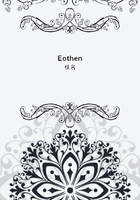
第102章
After a hurried breakfast on fragments of the last night's repast we strolled out over the extensive gardens. Here many a broken arbour and trellis, bending under masses of jasmine and honeysuckle, show the care and taste that were once lavished on this wild but beautiful hermitage: a garden-house, surrounded by an enclosure of roses run wild, lies in the midst of a grove of myrtle and bay trees. This was Lady Hester's favourite resort during her lifetime; and now, within its silent enclosure, "After life's fitful fever she sleeps well."The hand of ruin has dealt very sparingly with all these interesting relics; the Pasha's power by day, and the fear of spirits by night, keep off marauders; and though we made free with broken benches and fallen doorposts for fuel, we reverently abstained from displacing anything in the establishment except a few roses, which there was no living thing but bees and nightingales to regret. It was one of the most striking and interesting spots I ever witnessed: its silence and beauty, its richness and desolation, lent to it a touching and mysterious character, that suited well the memory of that strange hermit-lady who has made it a place of pilgrimage, even in Palestine. *The Pasha of Sidon presented Lady Hester with the deserted convent of Mar Elias on her arrival in his country, and this she soon converted into a fortress, garrisoned by a band of Albanians: her only attendants besides were her doctor, her secretary, and some female slaves. Public rumour soon busied itself with such a personage, and exaggerated her influence and power. It is even said that she was crowned Queen of the East at Palmyra by fifty thousand Arabs. She certainly exercised almost despotic power in her neighbourhood on the mountain; and what was perhaps the most remarkable proof of her talents, she prevailed on some Jews to advance large sums of money to her on her note of hand. She lived for many years, beset with difficulties and anxieties, but to the last she held on gallantly: even when confined to her bed and dying she sought for no companionship or comfort but such as she could find in her own powerful, though unmanageable, mind.
Mr. Moore, our consul at Beyrout, hearing she was ill, rode over the mountains to visit her, accompanied by Mr. Thomson, the American missionary. It was evening when they arrived, and a profound silence was over all the palace. No one met them; they lighted their own lamps in the outer court, and passed unquestioned through court and gallery until they came to where SHE lay. A corpse was the only inhabitant of the palace, and the isolation from her kind which she had sought so long was indeed complete. That morning thirty-seven servants had watched every motion of her eye: its spell once darkened by death, every one fled with such plunder as they could secure. A little girl, adopted by her and maintained for years, took her watch and some papers on which she had set peculiar value. Neither the child nor the property were ever seen again. Not a single thing was left in the room where she lay dead, except the ornaments upon her person. No one had ventured to touch these; even in death she seemed able to protect herself. At midnight her countryman and the missionary carried her out by torchlight to a spot in the garden that had been formerly her favourite resort, and here they buried the self-exiled lady. - FROM "THE CRESCENT ANDTHE CROSS," BY ELIOT WARBURTON.
While Lady Hester Stanhope lived, although numbers visited the convent, she almost invariably refused admittance to strangers. She assigned as a reason the use which M. de Lamartine had made of his interview. Mrs. T., who passed some weeks at Djouni, told me, that when Lady Hester read his account of this interview, she exclaimed, "It is all false;we did not converse together for more than five minutes; but no matter, no traveller hereafter shall betray or forge my conversation." The author of "Eothen," however, was her guest, and has given us an interesting account of his visit in his brilliant volume.